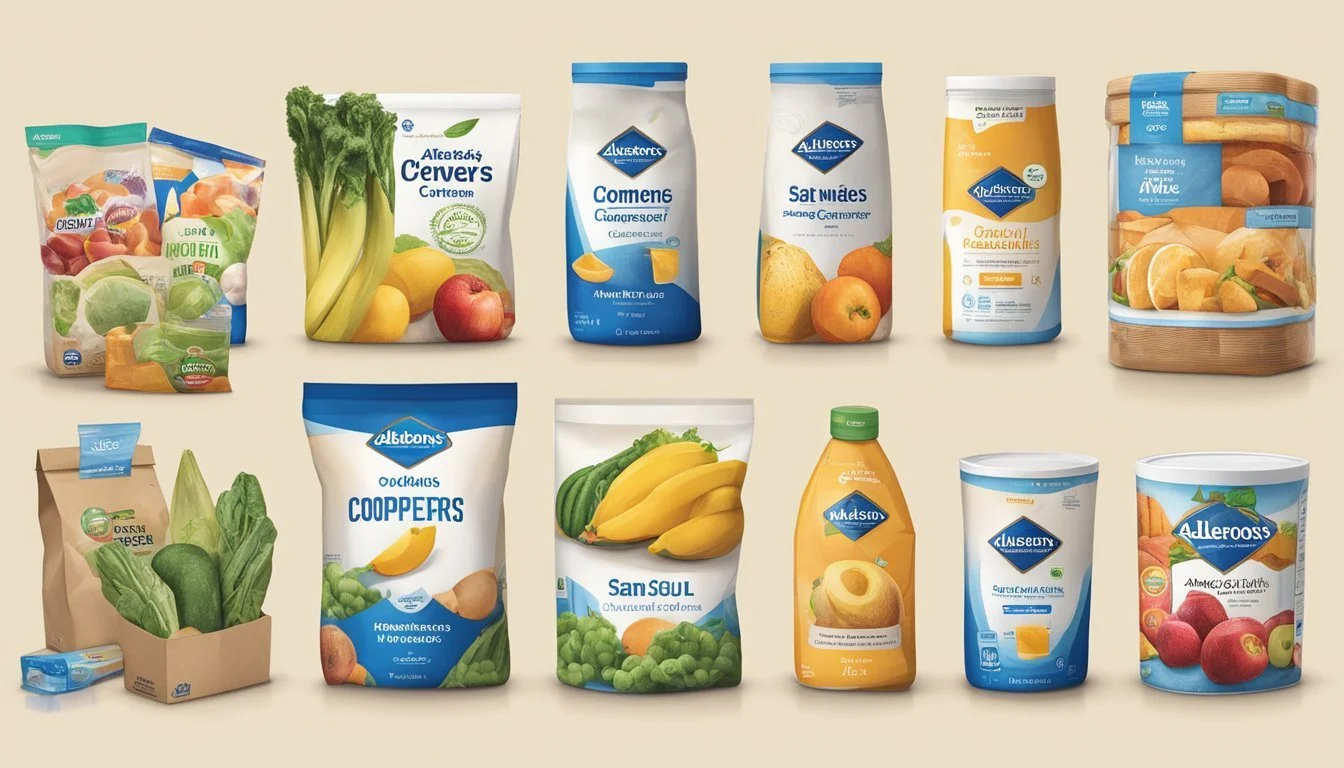Albertsons vs Sam's Club
Comprehensive Comparison of Grocery Stores
Part of Our Grocery Store Guide with Details on Albertsons and Sam's Club
When shopping for groceries, consumers often look for a balance between price, quality, and convenience. Albertsons and Sam's Club are two grocery retailers that offer distinct shopping experiences and are known for different strengths in the market. Albertsons, a traditional supermarket chain, offers a wide variety of products including fresh produce, meats, and pharmacy services, catering to a broad consumer base looking for one-stop shopping convenience. Sam's Club, on the other hand, operates on a membership model, providing bulk items at competitive prices, which can lead to significant savings for families and businesses alike.
The debate over which grocery store is better often revolves around individual shopping needs and preferences. Albertsons brings a community-focused approach with locations that are more numerous and accessible for quick trips or routine shopping. In contrast, Sam’s Club, with fewer locations, focuses on providing value in bulk purchases, an advantage for shoppers looking to stock up and save in the long run. These differing approaches underscore why some consumers may prefer the familiarity and service of Albertsons, while others opt for the economical bulk offerings of Sam's Club.
Quality of products is another important consideration for consumers. While Sam's Club excels in offering savings on large quantities, Albertsons competes with a selection of brands and diverse offerings that cater to a wide range of dietary needs and tastes. Deciding which grocery store is superior depends on whether the consumer values the traditional supermarket experience with its wider array of products or the bulk savings and membership benefits that a wholesale club like Sam's Club offers.
Grocery Store Profiles
Exploring the differences between Albertsons and Sam's Club is vital for consumers seeking to make informed choices. This analysis provides a concise overview of these prominent retailers in the grocery sector.
Albertsons Overview
Albertsons operates as a traditional supermarket chain offering a wide variety of food items, household goods, and pharmacy products. Founded in 1939, it has grown to become one of the largest food and drug retailers in the United States. Shoppers at Albertsons can expect a full-service grocery experience with bakery, meat, produce, seafood, and deli departments. The brand balances quality with value, often running promotions and providing a loyalty program to keep prices competitive.
Sam's Club Overview
Sam's Club, a subsidiary of Walmart, functions as a warehouse club where members can purchase bulk items and commercial supplies along with regular grocery products. Established in 1983, Sam's Club aims to offer lower prices primarily by selling products in large quantities. Unlike traditional supermarkets, Sam's Club requires a paid membership for shopping access. The warehouse model allows Sam's Club to offer significant savings on items ranging from groceries to electronics, leveraging Walmart's extensive supply chain for competitive pricing.
Membership and Access
When comparing Albertsons and Sam's Club, access to the stores and the cost of memberships play crucial roles in determining their value proposition to consumers.
Albertsons Accessibility
Albertsons operates on a non-membership basis, allowing consumers to shop without any upfront fees. Shoppers have the freedom to visit any Albertsons store during regular business hours, and there's no requirement to join a club or pay an annual fee to take advantage of their grocery offerings.
Sam's Club Membership Fees
Sam's Club, on the other hand, is a membership-only warehouse club that requires consumers to pay an annual fee. The standard Club membership is priced lower, offering instant savings on products, while the Plus membership carries a higher fee but includes additional benefits such as cash rewards, free shipping for online orders, and early shopping hours. The specific fees for membership options are:
Club Membership: Lower annual fee for basic access
Plus Membership: Higher annual fee with added perks such as 2% back on qualifying purchases and free shipping
Product Assortment and Brands
When comparing Albertsons and Sam's Club, the focus on exclusive brands and bulk offerings becomes a distinguishing factor between the two retailers. Both chains target different shopping experiences, from Albertsons' variety of distinct store brands to Sam's Club's emphasis on bulk-sized Member's Mark items and other products.
Albertsons Exclusive Brands
Albertsons offers a diverse range of exclusive store brands, designed to cater to varying customer needs across different product categories. Notably, they carry Signature Select, which is their mainstream line covering everything from pantry staples to ready-to-eat meals. There's also O Organics, an organic line providing shoppers with a wide selection of organic groceries including fresh produce, rice, pasta, and cereal. Another brand, Signature Farms, presents customers with fresh meat and produce, ensuring options for those seeking fresh and high-quality ingredients for their cooking needs.
Sam's Club Member's Mark and Bulk Purchases
Sam's Club, a membership-only warehouse club, is recognized for its Member's Mark brand. Since 1998, Member's Mark has been synonymous with value and quality, offering products that range from peanut butter, spaghetti, cereal, to bulk purchases of corn and rice. Sam's Club's bulk offerings especially appeal to customers looking for larger quantities, which might include businesses or large families. Their commitment to quality is manifested in their fresh meat and produce, as they maintain positive reputations regarding FDA standards. In addition, shopping at Sam's Club often means advantageous pricing for those buying in larger volumes.
Price Comparison
When comparing Albertsons and Sam's Club, consumers' decisions often pivot on the price differences for their grocery needs. Understanding each store's pricing strategies and a cost per pound analysis can shed light on potential savings.
Pricing Strategies
Sam's Club operates on a membership model, which typically allows them to offer lower prices across the board in exchange for an annual fee. Their prices are often less due to bulk purchasing and lower per-unit pricing. Albertsons, however, follows a more traditional retail grocery model, with regular weekly sales and promotions. Consumers may find that while Albertsons may have higher regular prices, strategic purchases utilizing coupons and sales can lead to substantial savings.
Cost Per Pound Analysis
Cost per pound is a crucial metric for consumers aiming to maximize their budget. Sam's Club, akin to its sibling store Walmart and competitor Costco, frequently offers lower cost per pound on many items due to the bulk format. This can translate into considerable savings for items purchased regularly or in large quantities. Albertsons may not compete as aggressively on the cost per pound, but selective shopping, especially in produce and meats, can still yield budget-friendly options.
It's important to note that a direct comparison may sometimes be affected by the brands offered; Sam's Club frequently stocks larger sizes and bulk packs, which contributes to their ability to reduce costs. Shoppers looking to compare prices at other grocery store chains such as Aldi, Target, Publix, or Kroger should also consider the individual pricing strategies and available sizes of those stores to ensure they're making accurate comparisons.
Quality and Freshness
When comparing Albertsons and Sam's Club, the elements of quality and freshness are paramount, especially in regards to produce, meats, and food safety protocols.
Freshness of Produce and Meats
At Albertsons, shoppers often find a variety of fresh fruits and vegetables alongside a selection of meats that cater to everyday needs as well as special occasions. Their produce and meats are frequently restocked to ensure freshness
Sam's Club, recognized for its bulk purchasing options, often provides fruits and vegetables in larger quantities, which can be beneficial for families and businesses. Rotisserie chicken and baked goods are highlighted as fresh options available daily. Their meat selection, while sold in larger packs, maintains a focus on quality.
Meats:
Albertsons: Wide range, includes organic options
Sam's Club: Larger packs, includes premium cuts
Produce:
Quality and selection may vary between locations.
Both stores provide seasonal items.
Albertsons vs Sam's Club Food Safety
Food safety is critical, and both grocery stores take measures to ensure their food products are safe for consumption. Albertsons and Sam's Club comply with local and federal food safety regulations, providing shoppers with safe and health-conscious options.
Food Safety Measures:
Regular quality checks
Compliance with health regulations
Albertsons employs quality control processes for milk, eggs, and other perishables to guarantee freshness. They keep a close eye on sell-by dates and proper storage temperatures.
Sam's Club focuses on maintaining a clean and hygienic environment in both the warehouse and the food court to prevent contamination. Products like bread, milk, and eggs are handled with care to uphold safety standards.
Location and Convenience
When deciding between Albertsons and Sam's Club, shoppers should consider the accessibility and practicality of each grocery store's locations, as well as the conveniences offered through their online platforms.
Store Proximity and Density
Albertsons operates a network of stores that are strategically placed to cater to shoppers in various regions, with a notable presence in the Midwest and states like Texas and Florida. The store density in these areas means that customers often have an Albertsons within a reasonable distance from their home or workplace, making it a convenient option for their routine grocery shopping needs.
On the other hand, there are 599 Sam's Club locations across the country, suggesting a widespread reach that could provide accessibility for customers in many regions. However, as a warehouse club, the store's locations are less dense compared to traditional regional grocery stores like Albertsons.
Online Shopping and App Features
Albertsons offers customers an app that facilitates online shopping, allowing them to purchase groceries directly from their smartphones. This app features a range of offers and personalized deals which can be utilized to save time and money.
In contrast, Sam's Club also provides shoppers with an online shopping experience through their app. The Sam's Club app is designed to enhance the customer's shopping experience by offering convenience-oriented features such as order-ahead capabilities and the ability to check club inventory in real-time.
Consumer Experience
When evaluating the consumer experience at Albertsons versus Sam's Club, key differentiators include customer service and store environment. Each aspect plays a crucial role in shaping shopper satisfaction and overall perception of the grocery store or supermarket experience.
Customer Service
At Albertsons, customer service is often characterized by easily accessible staff and a personal shopping experience. Shoppers tend to report positive interactions with employees, which can be attributed to Albertsons' focus on training for excellence in customer assistance.
Contrastingly, Sam's Club, being a membership-only warehouse club, offers a different approach to customer service. The bulk-shopping nature of the store may lead to less frequent staff-customer interactions, but the store compensates with efficient checkout processes and a responsive help desk for member inquiries.
Store Environment
Albertsons maintains traditional supermarket aesthetics with clear signage, well-organized aisles, and a focus on creating a welcoming atmosphere. Cleanliness and easy navigation through the store are top priorities, ensuring a pleasant shopping experience.
Sam's Club offers an expansive warehouse environment designed to support large-volume purchases. The store's layout is functional, prioritizing the display of bulk items over intricate decor. The wide aisle spaces accommodate both shoppers and the larger carts needed for bulk purchases, although the warehouse setting might be less cozy compared to typical grocery store environments.
Nutrition and Health
When comparing Albertsons and Sam's Club, customers are often interested in the availability and quality of organic and health-conscious products, as well as the use of hormones and antibiotics in protein sources.
Organic and Health-Conscious Offerings
Albertsons has a wide array of organic options across various product categories. Customers can find everything from organic fruits and vegetables to packaged goods that cater to specific dietary needs. Sam's Club also offers an assortment of organic products, including staples like Bob's Red Mill Oats and organic salad mixes, such as the Taylor Farms Organic 50/50 Baby Spring Mix and Baby Spinach Blend. Both stores provide a selection suited for health-conscious individuals looking for nutritious food choices.
Albertsons: Comprehensive organic section; features multiple brands.
Sam's Club: Carries organic products; including brands like Member's Mark.
Effects of Hormones and Antibiotics
The use of hormones and antibiotics is a significant concern for many consumers. While shoppers at both Albertsons and Sam's Club can find meat and poultry products without added hormones and antibiotics, the extent of the offerings may vary. Proactive shoppers are encouraged to look for specific labeling that indicates products are free from these additives. Labels such as "hormone-free" and "antibiotic-free" are commonly used indicators.
Antibiotic-Free Labels: Indicates animals were not given antibiotics.
Hormone-Free Labels: Denotes animals were raised without hormone treatments.
It is important for consumers to read labels and make informed choices based on their personal health and wellness goals.
Discounts and Deals
When comparing the discounts and deals between Albertsons and Sam's Club, shoppers should consider the variety of savings opportunities each store offers, including weekly ads, seasonal promotions, loyalty programs, and the impact of membership fees on overall savings.
Weekly Ads and Seasonal Promotions
Albertsons provides customers with weekly ads that showcase current deals on a variety of products, with special emphasis on seasonal items. Shoppers can expect to find discounts on produce, meats, and pantry staples. In addition, Albertsons frequently runs seasonal promotions during holidays and events, offering significant savings on relevant products.
Sam's Club, with its wholesale model, releases weekly ads that highlight bulk discounts and instant savings for its members. They also run seasonal promotions; for example, during back-to-school season, one can expect discounts on school supplies as well as electronics.
Loyalty Programs and Savings
Albertsons offers a loyalty program called Just for U, which provides personalized deals and discounts based on the shopper's purchasing history. Customers can also earn points on grocery and pharmacy purchases that can be redeemed for gas rewards or grocery discounts.
On the other hand, Sam's Club requires a paid membership to access its deals, with two main options: the standard Sam's Club Membership at $45/year and the Sam's Plus Membership at $100/year, which includes additional benefits like cash rewards and free shipping on most items. Members can take advantage of member-only prices on products across various categories. The membership fee often pays for itself through the savings on bulk purchasing for those who shop frequently.
Brand Reputation and Trust
Choosing the right grocery store is pivotal for many shoppers, where brand reputation plays a significant role in driving consumer trust and loyalty. Both Albertsons and Sam's Club stand out in the supermarket landscape, each with unique strengths impacting their market presence.
Consumer Trust and Brand Loyalty
Albertsons has built its reputation over the years by offering a wide range of products that caters to various consumer needs. Shopper satisfaction is often associated with the store’s commitment to quality, visible in their product selection, which ranges from standard supermarket fare to specialized organic selections akin to those found in Whole Foods Market or Trader Joe's.
In contrast, Sam's Club, a division of Walmart, maintains consumer trust through its bulk purchasing model, aligning it with stores like Costco. This model is rewarded with a loyal customer base, appreciative of the savings on bulk items and the perceived higher quality products compared to typical grocery store offerings.
Albertsons and Sam's Club Market Presence
Albertsons operates a vast network of stores with a notable presence, competing directly with supermarkets such as Kroger Private Selection. Its spread across diverse demographics showcases the brand's adaptability and commitment to meet the regional preferences of shoppers, often rivalling local establishments like Sprouts Farmers Market or ShopRite.
Sam's Club, on the other hand, has a significant market presence due to its 599 locations throughout the United States. While not traditionally categorized strictly as a supermarket, it holds a formidable degree of influence over grocery shopping habits, particularly for those prioritizing bulk purchases and FDA quality assurance, indicative of trust similar to that enjoyed by stores like WinCo or Hy-Vee.
Conclusion
In assessing Albertsons and Sam's Club, several core distinctions become apparent. Albertsons prides itself on offering safe and fresh products, catering to a customer base that values a traditional grocery shopping experience.
Sam's Club, with its 599 locations nationwide, presents a membership-based model, typically associated with bulk purchases and value. This chain focuses on quality and variety, often being recognized for maintaining FDA quality standards.
In terms of market presence, the sheer scale of Walmart and Sam's Club's operations, with their combined store count exceeding 5,300, underscores their dominant position in the grocery sector. Conversely, Albertsons maintains a strong, albeit smaller, market share and had plans for a merger with Kroger, which could have potentially reshuffled market standings.
Customers seeking traditional grocery shopping with attention to quality and freshness may lean towards Albertsons. In contrast, those looking for bulk purchases and membership benefits may prefer the economic scale of Sam's Club.
Here's a quick comparison:
Albertsons:
Traditional grocery shopping experience
Emphasis on fresh and safe products
Sam's Club:
Nationwide chain with a vast number of locations
Focus on bulk purchases and quality at competitive prices
These factors should guide consumers in choosing the store that best fits their shopping preferences and needs.











